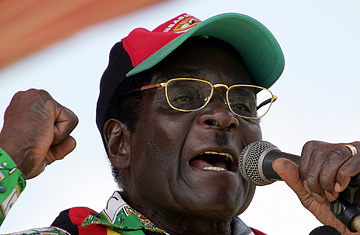
Zimbabwean President Robert Mugabe.
The news that Zimbabwean President Robert Mugabe is going to duck a meeting of southern African leaders on Saturday hints at his growing isolation in the region. And it looks likely to only prolong the crisis inside his own country. State radio announced Friday that Mugabe would miss a face-to-face meeting with opposition leader Morgan Tsvangirai at an emergency meeting of the 14-nation Southern African Development Community (SADC) in the Zambian capital Lusaka on Saturday. The emergency summit had been called by Zambian President Levy Mwanawasa to discuss the delay in the release of the results in Zimbabwe's presidential election held 13 days ago. Mugabe's Zanu-PF party had initially indicated that its leader would attend. Tsvangirai is still expected to show.
Although Tsvangirai's Movement for Democratic Change (MDC) won a parliamentary majority in the March 29 vote, the Zimbabwe Election Commission (ZEC) has not released the official result in the presidential race. An independent survey places Tsvangirai well ahead in the vote, and the MDC claims the poll gave him an outright victory after 28 years of Mugabe's rule.
The delay is widely seen as a stalling tactic by Mugabe's Zanu-PF regime to give its shock troops, government-allied mobs known as the "war veterans," time to fan out across the country, seize land and intimidate voters in the event of a run-off election against Tsvangirai. In an interview with TIME this week, Tsvangirai said what was happening in Zimbabwe was a "de facto military coup." Later his party announced its refusal to participate in a run-off, and on Friday the MDC issued pamphlets calling for a general strike to be launched on Tuesday, continuing until the presidential election result is announced. "We call upon transporters, workers, vendors and everyone to stay at home. The power is in our hands," read one pamphlet. "Zimbabweans have been taken for granted for too long. We demand that the presidential election results be announced now."
Mugabe's decision to miss the conference suggests that Tsvangirai's assessment — shared with TIME in a telephone interview from an undisclosed location Wednesday — that Mugabe's support in the region was evaporating may be accurate. In the past, Mugabe has found support and empathy from neighboring states in the SADC. Many southern African leaders, such as South African President Thabo Mbeki, are his peers in the African liberation movement. Others, such as Angolan President Jose Eduardo dos Santos, have ruled just as undemocratically, and for just as long. But Tsvangirai said even Mugabe's most stalwart supporters were now deserting him. "Everyone realizes he is a cheat," he said.
While Mugabe's isolation in the region is significant, it does nothing to resolve the political impasse in Zimbabwe, or its economic meltdown. Many now think the general election result may never be released. Mugabe's Zanu-PF have demanded a recount, even though the official result hasn't been released. Meanwhile, an opposition attempt to force the High Court to order the release of the results has so far served only to give the commission further grounds for delay. "The question of the results of the presidential election is now the subject of legal proceedings in the High Court," the ZEC said in a statement cited by the state-run Herald newspaper Friday. "Pending determination by that court, and in line with established rules of court, norms and procedures, the commission is unable to comment on this subject."
Nor is there any hope of an economic revival with Mugabe still in place. Human rights violations by the regime and repeated abrogation of the democratic process have limited international assistance to humanitarian aid. Mugabe's endorsement of the seizure of white farms at the turn of the millennium, and their ostensible redistribution to Zimbabwe's majority black population, may have been packaged as the redress of an historical injustice, but in reality the land found its way into the hands of a small cabal around Mugabe, many of whom let the fields rot. As a result, the heart has been ripped out of Zimbabwe's agriculture-based economy, and the former British colony now has a six-figure annual inflation rate, unemployment is 80%, and average life expectancy has dropped to 37 years.
